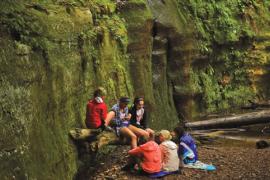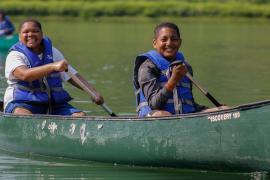“Can I try again?”
I heard those four words one morning at archery, spoken with shaky confidence by a 10-year-old named Jordan. He’d missed the target, not just the bullseye, but the entire hay bale — three times in a row. Behind him, a chorus of other campers had started to stir, ready for their turns. Our staff could have gently moved him along, but instead, the instructor paused, nodded, and said, “Of course you can.”
That extra shot? It didn’t hit the target either. But Jordan stood taller walking away. And later that day, I saw him try the climbing wall, something he’d said he was “terrible at.” He wasn’t suddenly brave because he hit a bullseye. He was brave because he didn’t.
At camp we often focus on the fun. But what’s more powerful is how camp makes space for safe failure. That space grows courage, character, and confidence in the kids we serve.
Redefining “Success” in the Camp Setting
In schools and sports leagues, success often means outperforming. In life, it’s often perfection or bust. But camp gives us a third option: success as growth.
At camp, trying counts. That’s why character is built here in ways that other environments struggle to replicate. When a child fails in a setting that holds them with empathy, encouragement, and structure, they don’t just recover, they grow.
This is where the magic of camp kicks in. It’s one of the rare places where failure can feel empowering instead of defeating. But this doesn’t happen by accident. It’s built intentionally by our staff, culture, and program design.
Psychological Safety: The Root of Courage
Psychological safety is the belief that you won’t be embarrassed, rejected, or punished for making a mistake; it is the foundation of risk-taking.
In high-functioning workplaces, it’s linked to innovation. In schools, it’s tied to deeper learning. At camp, it’s the bedrock of personal growth.
For many campers, summer programs are their first time away from home, first time trying archery, first time singing in front of others, or first time resolving a conflict without a parent’s help. Each of these experiences holds potential for failure — and that’s exactly why they build character.
When staff create an environment where failure is safe, campers are more likely to:
- Try something new
- Ask for help
- Take responsibility for mistakes
- Reflect and improve
- Encourage others to keep trying too
That last one is especially powerful. We’re not just shaping individual character; we’re shaping how kids show up in their communities.
What Safe Failure Looks Like at Camp
Too often we think of failure as dramatic. A camper breaks a rule, a game ends in tears, or a performance goes off-key. But most meaningful failures at camp are small and frequent:
- Forgetting lines in a skit
- Not making it across the zipline
- Getting homesick but deciding to stay
- Letting down a bunkmate and making amends
- Asking to redo a task after getting it wrong
In those small moments, growth happens if we help campers frame the experience.
Let’s compare two staff responses:
Scenario: A camper forgets their lines on stage and runs off in tears.
Response A: “It’s OK. Not everyone is meant for the stage. Don’t worry about it.”
Response B: “That was tough, huh? You were so brave to even try. Want to brainstorm how we could help you feel ready next time?”
Response A comforts but closes the door. Response B comforts and leaves it open. That’s how we teach resilience: not by removing risk, but by reinforcing that it’s safe to try again.
Practical Ways to Foster Growth Through Failure
Here are a few intentional strategies your staff can use to normalize and leverage failure in positive, character-building ways:
Praise the process, not the outcome. When we celebrate effort, courage, or reflection, rather than “winning,” we change how kids see success.
- “I saw you really focus that time. Great effort!”
- “You took a risk raising your hand. That was brave.”
- “It didn’t go the way you hoped, but you showed grit trying again.”
- Model your own mistakes. If we’re asking campers to be vulnerable, we must go first.
- Share stories of times you failed at something and what you learned.
- Let staff or leadership own minor mistakes publicly.
- Normalize saying, “I was wrong,” “Let’s try again,” or “That didn’t work, let’s rethink it.”
- Use reflective questions. After a setback, staff can guide growth with simple questions:
- What was the hardest part?
- What would you do differently next time?
- What are you proud of?
- What helped you get through it?
These questions train emotional intelligence, accountability, and resilience, all critical aspects of character.
Celebrate brave attempts. Host a “Risk Awards” ceremony or a “Tried-It Club” where kids are recognized for trying something new, regardless of success. This flips the script: bravery becomes the win.
When Failure Hurts: Supporting Recovery and Repair
Failure can be empowering, but only when campers feel supported. There are moments when a failed attempt leads to embarrassment, frustration, or even conflict. In those moments, staff should:
- Validate the emotion. “That felt really disappointing, didn’t it?”
- Stay calm and supportive. Avoid “It’s no big deal” if it clearly was.
- Help them name the lesson. “What do you think you’d try differently next time?”
- Offer a pathway forward. “Would you like to try again tomorrow?”
This approach doesn’t rescue; it restores. It tells kids: You’re still worthy. You’re still part of the group. You’re still growing.
Staff Training: Creating a Culture of Courage
To truly embed this mindset into your camp culture, start with your staff. Here’s how:
- Role-play common camper failures (stage fright, game losses, not making a friend) and practice responses.
- Teach the difference between rescuing and supporting.
- Encourage staff to highlight “try again” moments during staff meetings.
- Include growth mindset language in your cabin chats and awards.
- Remind staff that they don’t need to “fix” the feeling — they need to witness it and help campers make meaning of it.
Character Is Built in the Struggle, Not the Success
We all want campers to succeed — to win the game, sing the song, finish the hike. But real character is built in the moment after things don’t go right, when:
- a kid realizes they can get back up.
- they’re offered grace, not shame.
- someone says, “Try again,” and means it.
That kind of character lasts far beyond the session. It shows up when they take a deep breath before a class presentation. When they try out for a team even if they’re unsure. When they speak up for a friend or admit they were wrong.
Camp is more than a playground. It’s a proving ground for becoming. So, let’s build programs, train staff, and shape culture in a way that teaches kids they are safe to try and safe to fail.
Because that’s how we grow.
Photos courtesy of Camp Friendship, Palmyra, VA; Camp Moon River at Savannah Country Day School, Savannah, GA.
Michael Garcia is a nationally recognized youth development expert with over 30 years of experience in camp, after-school, and teen programming. He is the founder of Youth Development Pro, a training and mentoring platform that equips youth professionals with practical tools, resources, and inspiration to lead with empathy, creativity, and confidence. Michael is the author of Becoming a Modern Mentor: Developing Youth Leaders and speaks nationally on topics such as staff training, character building, and the power of play.


